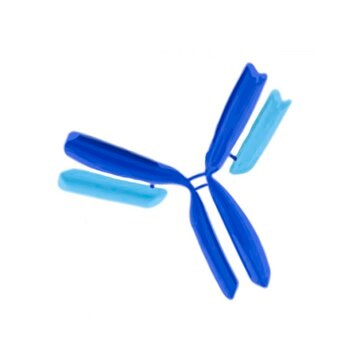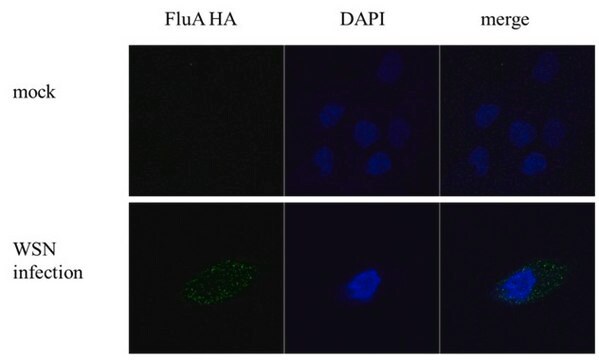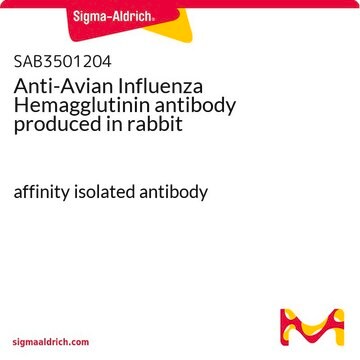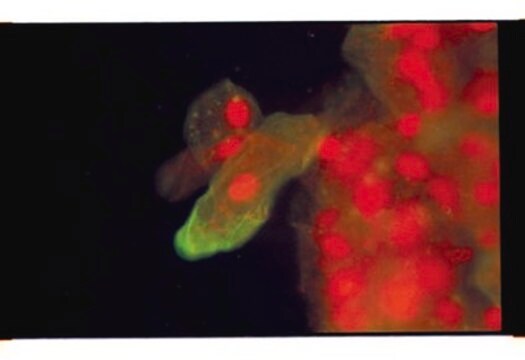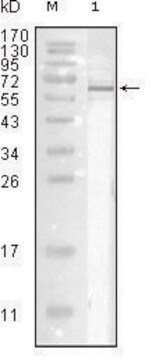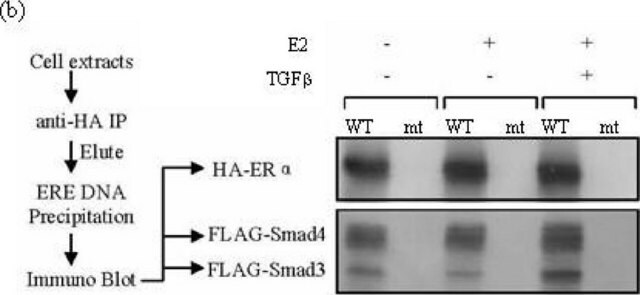AB1074
Anti-Influenza A Antibody
Chemicon®, from goat
Zaloguj sięWyświetlanie cen organizacyjnych i kontraktowych
About This Item
Kod UNSPSC:
12352203
eCl@ss:
32160702
NACRES:
NA.41
Polecane produkty
pochodzenie biologiczne
goat
Poziom jakości
forma przeciwciała
purified immunoglobulin
klon
polyclonal
reaktywność gatunkowa
human
producent / nazwa handlowa
Chemicon®
metody
ELISA: suitable
immunofluorescence: suitable
immunohistochemistry: suitable
western blot: suitable
Warunki transportu
wet ice
Specyficzność
Specific for Influenza A by IHA. Recognizes H1N1 and H3N2 and probably other Flu A strains. Non reactive with HEp-2 cells. May react with chicken cellular proteins. Does not react with Influenza B, RSV, Parainfluenza 1/2/3 or Adenovirus.
Immunogen
Influenza A-USSR (H1N1).
Zastosowanie
Anti-Influenza A Antibody is an antibody against Influenza A for use in ELISA, IF, IH & WB.
Applications include ELISA, fluorescence microscopy, immunoblotting; unboiled samples in 1mM DTT and 2% SDS only and immunohistochemistry. Final working dilutions must be determined by end user.
Titer: 1:1,000 by indirect immunofluorescence. (1:2,500 by hemagglutination inhibition.)
Titer: 1:1,000 by indirect immunofluorescence. (1:2,500 by hemagglutination inhibition.)
Research Category
Infectious Diseases
Infectious Diseases
Research Sub Category
Infectious Diseases - Viral
Infectious Diseases - Viral
Postać fizyczna
Format: Purified
Protein A Purified goat immunoglobulin in PBS (0.01 M, pH 7.2) with 0.1% sodium azide as a preservative.
Protein A purified
Przechowywanie i stabilność
Maintain at +2–8°C for 3 months or at -20°C in aliquots for up to 12 months after date of receipt. Avoid repeated freeze/thaw cycles.
Komentarz do analizy
Control
Influenza Control Slides, Catalogue Number 5010-5
Influenza Control Slides, Catalogue Number 5010-5
Inne uwagi
Concentration: Please refer to the Certificate of Analysis for the lot-specific concentration.
Informacje prawne
CHEMICON is a registered trademark of Merck KGaA, Darmstadt, Germany
Oświadczenie o zrzeczeniu się odpowiedzialności
Unless otherwise stated in our catalog or other company documentation accompanying the product(s), our products are intended for research use only and are not to be used for any other purpose, which includes but is not limited to, unauthorized commercial uses, in vitro diagnostic uses, ex vivo or in vivo therapeutic uses or any type of consumption or application to humans or animals.
Ta strona może zawierać tekst przetłumaczony maszynowo.
polecane
Kod klasy składowania
10 - Combustible liquids
Klasa zagrożenia wodnego (WGK)
WGK 2
Temperatura zapłonu (°F)
Not applicable
Temperatura zapłonu (°C)
Not applicable
Certyfikaty analizy (CoA)
Poszukaj Certyfikaty analizy (CoA), wpisując numer partii/serii produktów. Numery serii i partii można znaleźć na etykiecie produktu po słowach „seria” lub „partia”.
Masz już ten produkt?
Dokumenty związane z niedawno zakupionymi produktami zostały zamieszczone w Bibliotece dokumentów.
Klienci oglądali również te produkty
Amy Y Chang et al.
Respiratory research, 17(1), 62-62 (2016-05-25)
The hexapeptide SLIGRL-amide activates protease-activated receptor-2 (PAR-2) and mas-related G protein-coupled receptor C11 (MRGPRC11), both of which are known to be expressed on populations of sensory nerves. SLIGRL-amide has recently been reported to inhibit influenza A (IAV) infection in mice
Wataru Yamazaki et al.
Transboundary and emerging diseases, 66(1), 341-348 (2018-09-30)
Transboundary animal diseases, including highly pathogenic avian influenza, cause vast economic losses throughout the world. While it is important to identify the sources and propagation routes of the spread, such strategies are often hindered by incomplete epidemiological evidence. Isolation/detection of
Hao Chen et al.
Virology journal, 14(1), 242-242 (2017-12-24)
Numerous toxicological studies have focused on injury caused by exposure to single types of nanoparticles, but few have investigated how such exposures impact a host's immune response to pathogen challenge. Few studies have shown that nanoparticles can alter a host's
Mechanism of inactivation of influenza viruses by immobilized hydrophobic polycations.
Hsu, BB; Yinn Wong, S; Hammond, PT; Chen, J; Klibanov, AM
Proceedings of the National Academy of Sciences of the USA null
Xiang Xu et al.
PloS one, 11(10), e0164501-e0164501 (2016-10-08)
Host-derived proteases can augment or help to clear infections. This dichotomy is exemplified by cathepsin L (CTSL), which helps Hendra virus and SARS coronavirus to invade cells, but is essential for survival in mice with mycoplasma pneumonia. The present study
Nasz zespół naukowców ma doświadczenie we wszystkich obszarach badań, w tym w naukach przyrodniczych, materiałoznawstwie, syntezie chemicznej, chromatografii, analityce i wielu innych dziedzinach.
Skontaktuj się z zespołem ds. pomocy technicznej